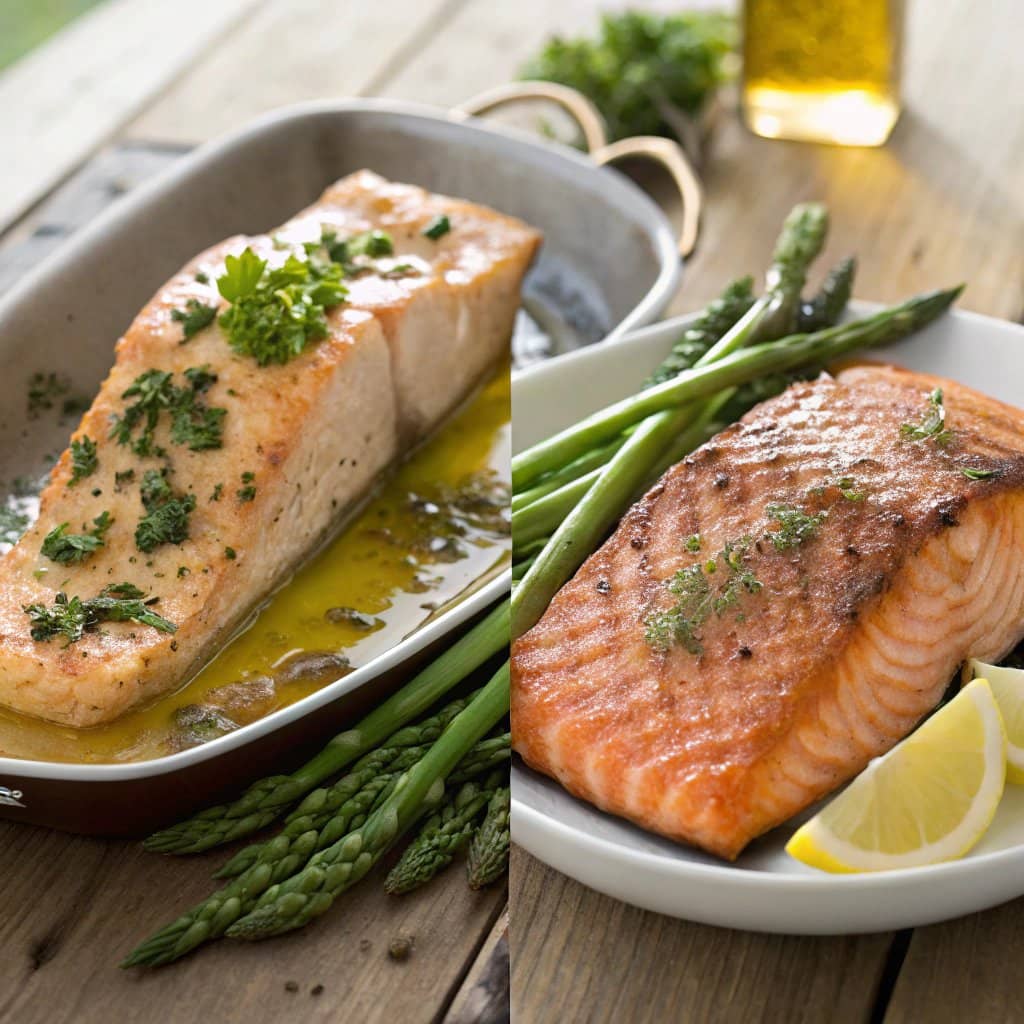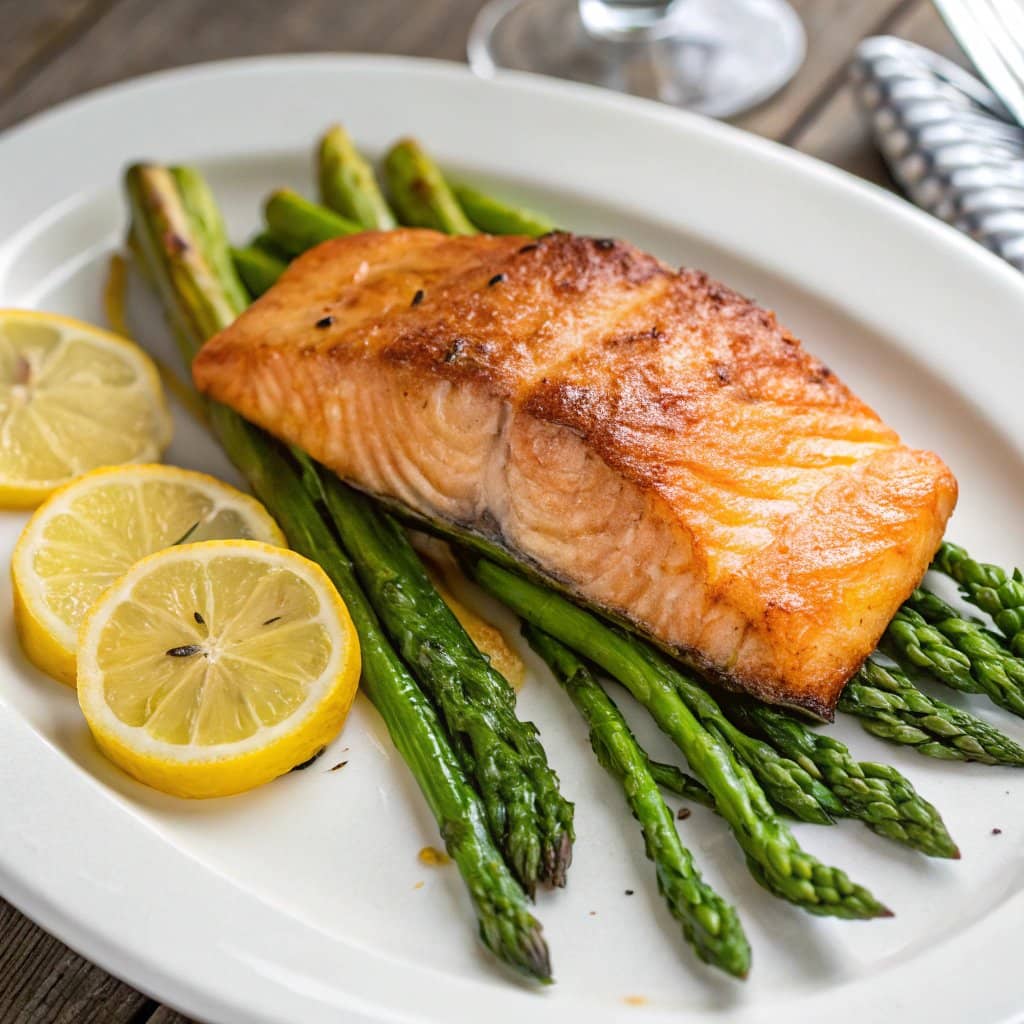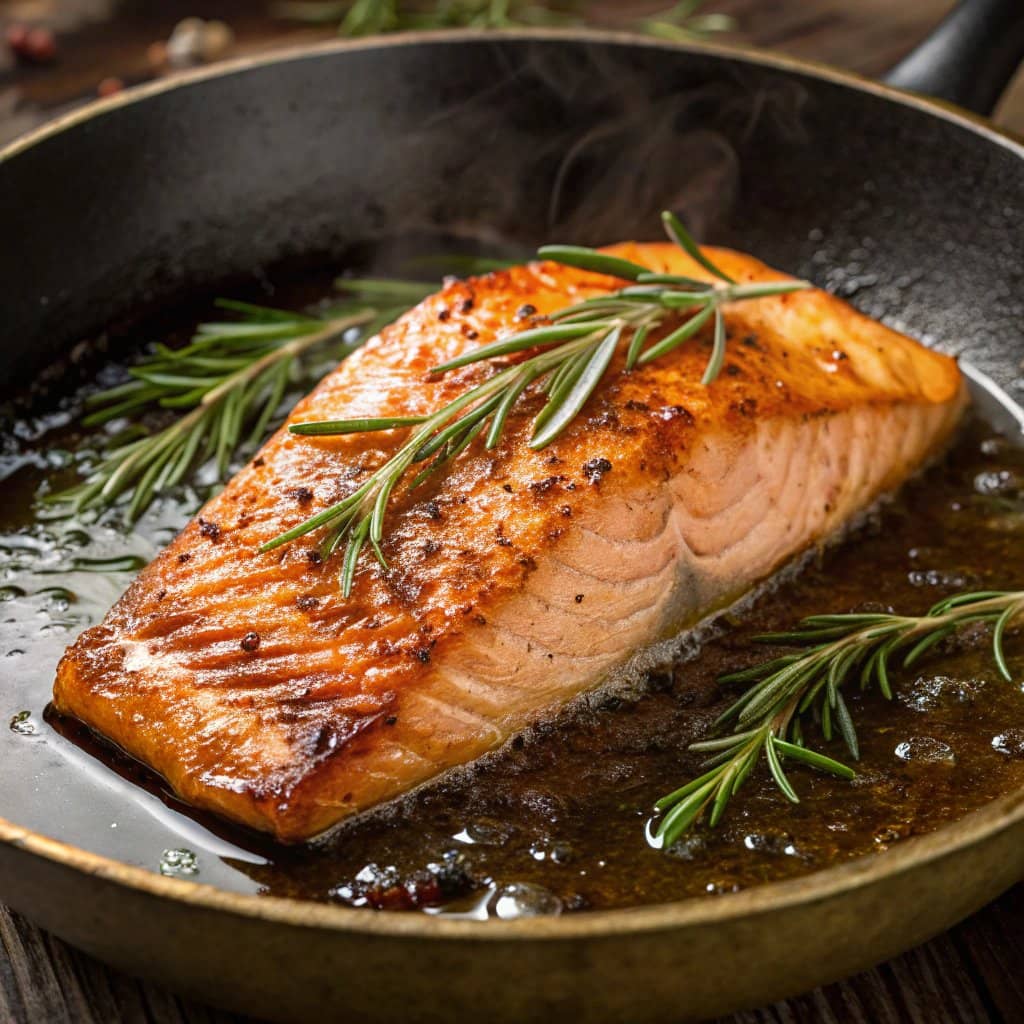Butter or Oil for Salmon – this is one of the biggest decisions you’ll face when cooking salmon. Each option brings something unique to the table. Butter offers richness and depth, while oil provides a clean, crisp finish. Choosing the right fat can enhance the flavor of your salmon and make it cook to perfection.
In this article, we’ll explore the benefits of both butter and oil for cooking salmon. We’ll also help you decide which option works best based on your taste, recipe, and health goals. By the end, you’ll know exactly how to cook salmon that’s both delicious and nutritious.
Table of Contents
Understanding Butter and Oil
Butter vs. Oil: What’s the Difference?
Butter and oil are both fats, but they differ in flavor, cooking properties, and nutritional profiles. Butter is made from cream and has a rich, creamy taste. It’s ideal for adding flavor and giving dishes a golden, caramelized finish. However, it has a lower smoke point, which means it can burn at high temperatures.
On the other hand, cooking oils like olive oil or vegetable oil have a higher smoke point. This makes them better for frying or searing salmon over high heat. Oils also have a neutral flavor (unless you’re using extra virgin olive oil), allowing the natural taste of salmon to shine.
Cooking Salmon with Butter
Benefits of Using Butter
Butter adds a luxurious, creamy flavor to salmon that’s hard to beat. It enhances the natural sweetness of the fish and gives it a golden-brown crust when cooked. Butter is also perfect for basting salmon, keeping it moist and tender while adding layers of richness.
Another benefit of butter is its versatility. Whether you’re pan-searing, baking, or grilling, butter works well in recipes where flavor is the star. Plus, its slightly nutty aroma, especially when browned, can make your dish smell heavenly.
Tips for Cooking Salmon with Butter
- Use low to medium heat: Butter has a low smoke point, so cook on moderate heat to prevent it from burning.
- Combine with oil: Mixing butter with oil, like olive oil, can raise its smoke point and allow you to enjoy the flavor of butter without worrying about scorching.
- Baste for extra flavor: Melt butter in the pan and spoon it over the salmon as it cooks for a richer taste and a shiny finish.
- Add herbs and garlic: Infusing butter with fresh herbs like thyme or rosemary and a touch of garlic will elevate the flavor of your salmon.
Best Recipes with Butter
- Garlic Butter Salmon: A quick recipe that combines butter, garlic, and parsley for a flavorful, juicy fish.
- Brown Butter Salmon: Cooked until the butter turns golden, this recipe brings out a nutty, caramelized flavor.
- Lemon Butter Salmon: Perfect for adding brightness, this dish blends butter with zesty lemon juice.
Butter works best in recipes where you want to highlight richness and indulgence.
Cooking Salmon with Oil
Benefits of Using Oil
Cooking salmon with oil offers a clean and crisp texture, allowing the natural flavor of the fish to shine. Oils like olive, avocado, or vegetable oil have a higher smoke point than butter, making them ideal for high-heat cooking methods like frying or searing.
Oil also provides a lighter coating, which helps create a crispy exterior without overpowering the salmon’s taste. Additionally, oils are more stable at high temperatures, ensuring even cooking and less risk of burning your food.
Types of Oil for Cooking Salmon
- Olive Oil: A popular choice, olive oil adds a subtle fruity flavor and is excellent for pan-searing or baking salmon.
- Avocado Oil: With its high smoke point and mild taste, avocado oil is perfect for grilling or frying salmon.
- Coconut Oil: While less common, it gives salmon a slightly sweet and tropical note, ideal for creative recipes.
- Vegetable Oil: A neutral option, vegetable oil is versatile and works well when you want the salmon’s flavor to stand out.
How to Achieve Perfectly Cooked Salmon with Oil
- Preheat your pan: Heat the oil in a skillet before adding the salmon to ensure a non-stick surface and even cooking.
- Use the right amount: Coat the pan lightly with oil to avoid excess grease.
- Cook skin-side down first: If your salmon has skin, start with the skin-side down to make it crispy and flavorful.
- Don’t overcrowd the pan: Cook salmon in small batches if needed, ensuring each piece gets a nice sear.
Popular Recipes with Oil
- Pan-Seared Salmon: Achieve a restaurant-quality crispy crust with olive or avocado oil.
- Grilled Salmon with Herb Oil: Brush salmon with a mix of oil, garlic, and fresh herbs before grilling.
- Crispy Salmon Skin: Use vegetable oil to fry salmon skin into a crispy, delicious garnish.
Cooking with oil ensures a lighter and healthier preparation while allowing for versatility across many recipes.
Butter vs. Oil: Which is Better?

When to Choose Butter
Butter is the best choice when you’re aiming for rich, flavorful salmon. If you’re preparing dishes where the sauce or glaze is a key element, butter’s creamy texture and taste will complement your salmon perfectly.
Ideal scenarios for using butter include:
- When baking salmon with garlic, lemon, or herbs.
- For recipes where the salmon is basted during cooking for extra moisture.
- When creating indulgent dishes for special occasions, like holiday meals.
When to Choose Oil
Oil is the better choice for high-heat cooking methods like frying, grilling, or roasting. It’s also great for recipes where you want to keep the flavor light and let the salmon’s natural taste shine.
Situations where oil works best include:
- When you’re pan-searing salmon to achieve a crispy crust.
- For grilling salmon without worrying about burning or sticking.
- When focusing on healthier preparation, as many oils (like olive oil) have heart-healthy benefits.
Mixing Butter and Oil for the Best Flavor
Why choose one when you can use both? Mixing butter and oil combines the best of both worlds:
- Oil raises the smoke point of butter, making it safe to cook at higher temperatures.
- Butter adds its signature flavor, while the oil provides stability and prevents burning.
How to mix butter and oil:
- Heat a small amount of oil in your pan first.
- Add butter after the oil is hot but before cooking your salmon.
- This method ensures your butter melts evenly without scorching.
Pairing butter and oil is perfect for achieving both flavor and functionality in your salmon dishes.
Health Considerations

Nutritional Differences Between Butter and Oil
When it comes to health, butter and oil have distinct profiles. Understanding their differences can help you make the right choice for your diet.
- Butter: Butter contains saturated fats and a small amount of cholesterol, which can contribute to heart health concerns if consumed in excess. However, it’s also a source of fat-soluble vitamins like A, D, E, and K.
- Oil: Most cooking oils, like olive or avocado oil, are high in unsaturated fats. These fats are known to support heart health by lowering bad cholesterol levels. Oils like extra virgin olive oil also contain antioxidants, which can reduce inflammation.
Balancing Flavor and Health
Striking the right balance between flavor and health is essential when choosing between butter and oil. Here are some tips:
- Use butter sparingly to enjoy its flavor without overloading on saturated fat.
- Opt for healthier oils like olive or avocado oil when cooking at high heat or preparing everyday meals.
- Consider using ghee (clarified butter) as an alternative, which has fewer milk solids and a higher smoke point.
- Combine butter and oil for special recipes where you want both flavor and a healthy twist.
Portion Control
Regardless of your choice, portion size matters. Using too much butter or oil can increase the calorie count of your dish. Stick to these guidelines:
- For pan-searing, a tablespoon of oil or butter is usually sufficient for 2-3 salmon fillets.
- When baking or roasting, lightly coat the fish to avoid adding unnecessary fat.
By choosing the right fats and controlling portions, you can enjoy salmon that’s both delicious and aligned with your health goals.
You Might Also Like
Love experimenting with bold flavors? Don’t stop here! Check out these delicious recipes to keep your creativity flowing in the kitchen:
- Salmon Bites: A quick and flavorful snack or appetizer made with tender salmon cubes, marinated to perfection.
- Protein Bread: A nutritious and hearty bread recipe packed with protein, perfect for sandwiches or as a side dish.
- Avocado Lime Ranch Dressing: A creamy, tangy dressing that pairs wonderfully with salads, wraps, or even as a dip.
FAQs
1. Can I use both butter and oil when cooking salmon?
Yes, you can use both butter and oil to get the best of both worlds. Oil helps stabilize the butter at high temperatures, preventing it from burning, while butter adds richness and flavor to the salmon.
2. What is the healthiest oil to use for cooking salmon?
Olive oil, especially extra virgin, is considered one of the healthiest options. It’s rich in monounsaturated fats and antioxidants, which support heart health. Avocado oil is another great choice due to its high smoke point and mild flavor.
3. Will using butter make salmon too greasy?
Not if you use the right amount. A tablespoon of butter is typically enough to coat a pan and flavor 2-3 salmon fillets. Pairing it with oil can also help prevent an overly greasy texture.
4. Does butter burn more easily than oil?
Yes, butter has a lower smoke point, which makes it more prone to burning at high heat. To avoid this, cook on medium heat or mix butter with oil for better stability.
5. Which fat is better for grilling salmon?
Oil is generally better for grilling salmon because of its higher smoke point and lighter texture. Brush the salmon with oil before placing it on the grill to prevent sticking.
6. Can I skip using butter or oil altogether?
Yes, you can cook salmon without added fat by steaming or poaching it. However, using a small amount of butter or oil enhances flavor and prevents the fish from drying out.
Conclusion
When deciding between butter and oil for cooking salmon, there’s no one-size-fits-all answer. Butter brings richness and indulgence, making it ideal for recipes that prioritize flavor. Oil, on the other hand, is versatile and healthier, perfect for high-heat cooking or lighter dishes.
For the ultimate experience, try combining both to achieve a balance of flavor and functionality. Whether you’re baking, frying, or grilling, the key is to choose the right fat for your cooking method and personal preferences. With these tips, you can create perfectly cooked salmon that’s as delicious as it is nutritious.

